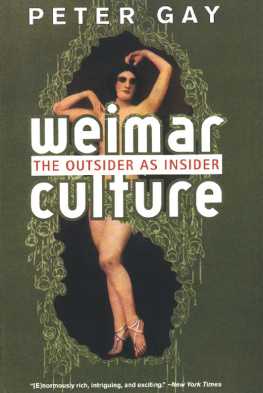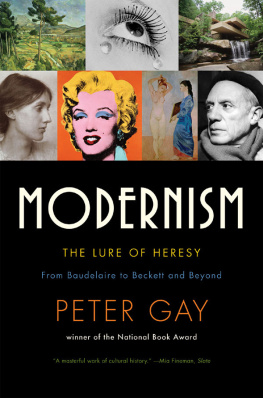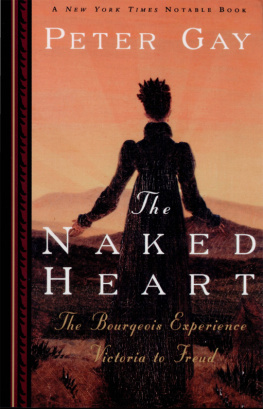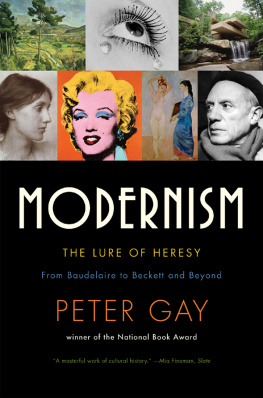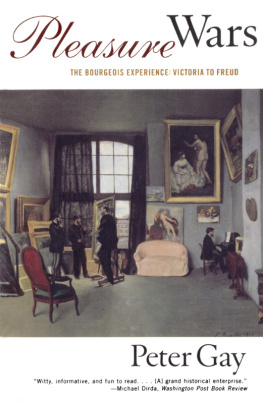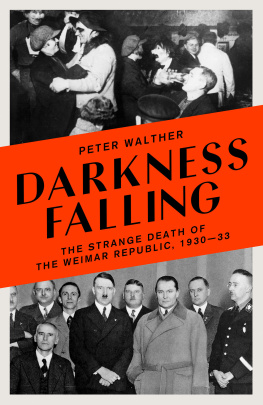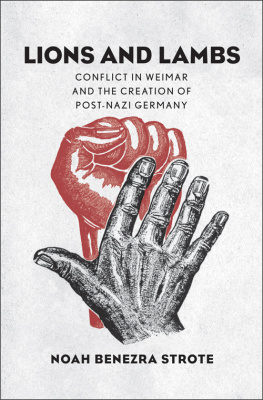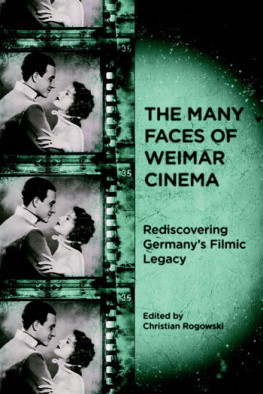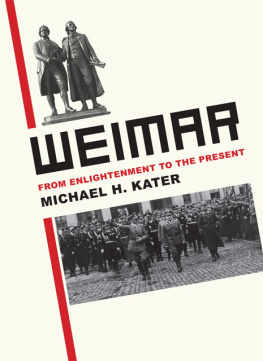WEIMAR CULTURE
BOOKS BY PETER GAY
Schnitzlers Century:
The Making of Middle-Class Culture, 18151914 (2001)
The Bourgeois Experience: Victoria to Freud
Education of the Senses (1984)
The Tender Passion (1986)
The Cultivation of Hatred (1993)
The Naked Heart (1995)
Pleasure Wars (1998)
Reading Freud: Explorations and Entertainments (1990)
Freud: A Life for Our Time (1988)
A Godless Jew:
Freud, Atheism, and the Making of Psychoanalysis (1987)
Freud for Historians (1985)
Freud, Jews and Other Germans:
Masters and Victims in Modernist Culture (1978)
Art and Act: On Causes in HistoryManet, Gropius, Mondrian (1976)
Style in History (1974)
Modern Europe (1973), with R. K. Webb
The Bridge of Criticism: Dialogues on the Enlightenment (1970)
The Enlightenment: An Interpretation
Vol. II: The Science of Freedom (1969)
Weimar Culture: The Outsider as Insider (1968)
A Loss of Mastery: Puritan Historians in Colonial America (1966)
The Enlightenment: An Interpretation
Vol. I: The Rise of Modern Paganism (1966)
The Party of Humanity: Essays in the French Enlightenment (1964)
Voltaires Politics: The Poet as Realist (1959)
The Dilemma of Democratic Socialism:
Eduard Bernsteins Challenge to Marx (1952)
To FELIX GILBERT
Ambassador of the Weimar Spirit
Copyright 2001, 1968 by Peter Gay
First published as a Norton paperback 2001
All rights reserved
Substantial parts of this book appeared, in somewhat different forms, in Perspectives in American History, II (1968).
LIBRARY OF CONGRESS CATALOG CARD NUMBER: 68-29572
For information about permission to reproduce selections from this book, write to Permissions, W. W. Norton & Company, Inc., 500 Fifth Avenue, New York, NY 10110
ISBN 978-0-393-06959-4 (e-book)
W. W. Norton & Company, Inc.
500 Fifth Avenue, New York, N.Y. 10110
www.wwnorton.com
W. W. Norton & Company Ltd.
Castle House, 75/76 Wells Street, London WIT 3QT
The Weimar Republic had a short, hectic, and fascinating life. It was born on November 9, 1918, when the German Empire collapsed after four years of war and Emperor Wilhelm II was preparing to flee into exile in the Netherlands; it was murdered on January 30, 1933, when President Paul von Hindenburg, no longer at the height of his powers, appointed the charismatic leader of the National Socialist party, Adolf Hitler, chancellor of the country. As the brief history of the republic appended to this text documents (p. 147), it was a time of almost continuous political upheaval, of brave efforts at stability steadily undermined by economic ups and downsmostly downssabotaged on the right by antidemocratic forces and on the left by Communists following orders from Moscow. At the same time, the Weimar Republic was a breathless era of cultural flowering that drew the worlds attention to German dance, German architecture, German filmmaking, German fiction, German theater, German art and music. The republic provided clusters of excitement way out of proportion to the mere fourteen years of its life.
The contrast between these political struggles and this cultural creativity, to say nothing of the sheer volume of innovation in the arts and letters, has thrown almost insurmountable obstacles in the historians way. The bibliography I have compiled for this book amply attests that there was abundant material for the student of the Weimar Republic, both primary sources and secondary treatments. But it is telling that when I started to research the republic, there were no comprehensive studies of its cultural life. The general histories then availablethe best by the liberal Erich Eyck and the radical Arthur Rosenbergconcentrated on politics and defended a distinct, strongly held point of view. I had no wide-ranging model to pattern myself on or to rebel against. And the historical works that touched on Weimar Culture at all were given to excessive enthusiasm: there was much talk of the golden twenties. It soon became clear to me that I would have to start all over, to explore as many sources as I could find, to get beyond hyperbole or cynicism.
The book published in 1968 was, I am pleased to say, a success. Its reappearance here to join the distinguished list of Norton paperbacks is exceedingly welcome to me. It gave me an opportunity to revisit my old text, and after some thought, I have chosen to let it stand unchanged. I remain committed to its central argument, which I announce in its subtitle and pursue throughout the book: in the Weimar Republic outsidersdemocrats, Jews, avant-garde artists, and the likebecame insiders, decision makers in museums, orchestras, theaters, private centers of scholarship. To say this, a point on which I want to insist, is to imply that these outsiders had already been active in the late Empire. In the opening pages of the first chapter, I offer some confirmation of my thesis that Weimar Culture was not encapsulated, not simply a product of a lost war. In short, the talents and the energies that were to make the republic virtually unique in historycertainly in German historydid not emerge from nowhere, virginal and unknown. But not until the disastrous end of empire could they really rise to their full potentialities.
Even though each chapter has its dominant topic, I organized Weimar Culture chronologically, so that the reader could easily recognize the intimate ties between culture and politics at every point. The text should offer few difficulties. But its republication is a good opportunity to address some issues raised by reviewers. The Weimar Republic, though it gave Jews unprecedented prominence across a wide scope, was not a Jewish republic, as its enemies have so often proclaimed it to be. It would not have been worse if it had been, but Jews taking a significant part in German culture were wholly assimilated. They were Germans. Ernst Cassirers work on Kant was not a Jewish Kant; Bruno Walters Beethoven was not a Jewish Beethoven. It was precisely the largely untroubled cooperation of Jews and gentiles in their common pursuit of modernism that made the Weimar Republic so remarkable a phenomenon. The mere mention of some of its icons makes that plain. If the drafter of its constitution, Hugo Preuss, was a Jew, Walter Gropius the architect, Bertolt Brecht the playwright, Paul Tillich the theologian, Ernst Ludwig Kirchner the painter, Marlene Dietrich the actress, were all gentiles.
For rational readers, this was not a difficult topic to dispose of, but the psychoanalytic titles I gave several chapters in this book raised a harder question. They are not casual, not mere window dressing. When I wrote Weimar Culture, I was still years away from the psychoanalytic training I would undergo in New Haven, but I was already persuaded that historians could find Freuds ideas useful. When I spoke of the trauma of birth, the revolt of the sons, and the revenge of the fathers, I had no intention of treating a historical period as though it were literally an individual being born, living, and dying. These descriptions were analogies, but analogies that were more than verbal. They called attention to a widespread psychological situation in Germany between 1918 and 1933. The creation of modern states, whether the United States, a united Italy, or Bismarcks empireand the Weimar Republicall followed upheavals that made their origins possible and difficult at the same time. But the other states I have listed were all fruits of victory; the Weimar Republic, for its part, was the offspring of, and had to cope with, abject defeat. Certainly one important cause of the republics end was precisely that its beginning had been so traumatic and that it was from the outset surrounded by adversaries who only wanted to do away with it. To speak of the revolt of the sons and the revenge of the fathers is to restate the point of my subtitle: the outsiders were on the whole people energized by a youthful desire to discard time-honored ideas and institutions. The fathers who revenged themselves on their rebellious brood were ideologues who mourned lost traditions and a lost empire. The point I wanted to make was that emotional commitments to the new and the old, whether rational or fanatical, were not merely masks for economic interests but profoundly felt ideals and regrets. It was emblematic for this psychological combat that the last president of the Weimar Republic should have been an aged general from the First World War.

